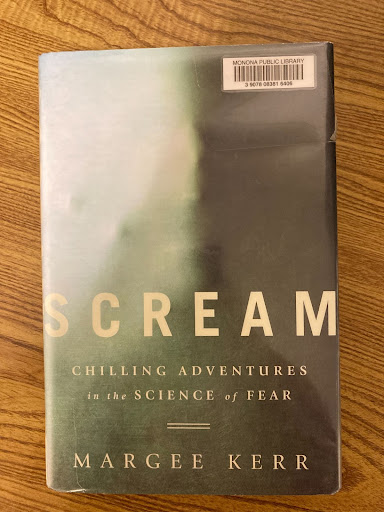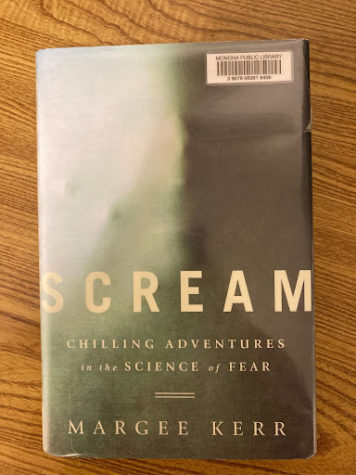Be wary of scary (movies)!

Scream; Chilling Adventures in the Science of Fear by Margee Kerr
January 20, 2022
“You have a test tomorrow!” What is the first emotion you feel when you hear that? Fear, right? Fear is an unpleasant feeling triggered by the perception of danger, real or imagined. Fear can affect our bodies and our personalities more than one may think. Fear can cause us to act irrationally and misjudge situations and their intensity or seriousness.
To begin, fear protects us, making us more responsive to danger. According to Nemours Teen Health, a foundation committed to helping the world of medicine and health for kids, fear can be a cautious warning that danger is near or approaching. Once our bodies sense the fear or threat our brain is able to tell us whether we need to go into flight or fight mode. Second, fear motivates you to build skills. Experiencing fear can help you build skills that train you to better react in high pressure or high intensity situations, giving you the opportunity to learn and grow from past experiences. Third, fear can help you dissect the extremes of situations that you experience in life. Most of us will come upon a scary situation. But is it really that scary? Experiencing fear can help you dissect and acknowledge the components of a threatening or unknown situation and can help you overcome that fear or best of all, conquer it.
Expanding on that, fear is something that we can and sometimes cannot control. So the question is, how do horror movies make us feel the way we do? Horror entertainment triggers things in our brains that create surges of adrenaline, endorphins, and dopamine. According to “A Healthier Michigan” an organization based in Michigan that provides insight on health-based issues, the release of the adrenaline and dopamine can actually cause the viewer of the movie to have a panic attack and or faint. Secondly, horror movies are designed to elicit certain emotions in someone. Besides the obvious fear that we feel while watching horror movies, these movies can make us feel emotions like sadness, confusion, panic, or anger which may cause us to act out of sorts or in a new or different way than we normally would. Lastly, horror movies can cause desensitization. Similar to something I heard in both of my interviews, watching horror movies too frequently can cause something called desensitization. Desentization is a process that diminishes emotional responsiveness to a negative or positive stimulus after repeated exposure to it. Cassie Stremkowski, a junior at SPASH states “I think if you watch horror movies that are worse than the typical ones,I think that it could really impact you. I think that if you watch some of the worse ones like Tusk or Cannible Holocaust that it could be a pipeline into potentially making you a psychopath. It can desensitise you and it has a social effect sometimes.”
As we are coming to a finish in this article, understanding how the brain is impacted by this emotion is most crucial. Fear can interrupt processes in our brain Although fear in itself may be a good thing to experience due to the benefits, there are certain negatives about how it affects our brain. It can interrupt the processes in our brain which cause us to regulate emotions, thinking before acting, and acting appropriately according to the situation at hand. Next, fear triggers certain parts in our brain that can cause us to act these ways. From the book, “Scream; Chilling Adventures in the Science of Fear” by Margee Kerr she states ”The amygdala then triggers a whole host of reactions throughout the brain and body (in other words, activation of the sympathetic nervous system)” This relates to my first point. When the body begins to sense fear the amygdala is triggered in the brain which sends the body into the best known “fight or flight” mode. This could cause the body to make irrational or uncalled for movements or actions which can cause harm in the long run. My final point is quite similar to my second, that being that different parts of the brain cause different reactions when mixed with fear. “The vagus nerve plays a big role in our threat response: it’s an umbrella of nerves that alerts us that something is wrong by collecting information.” Similar to the amygdala nerve, the vagus nerve interfaces with the parasympathetic control of the heart, lungs, and digestive tract.
In conclusion, similar to our favorite junk food fear is something that we should only experience in moderation if at all possible. Although it comes with positives such as building necessary skills it also comes with negatives like being unable to control thoughts, feelings, or actions, and or potentially turning you into a psychopath.





































































